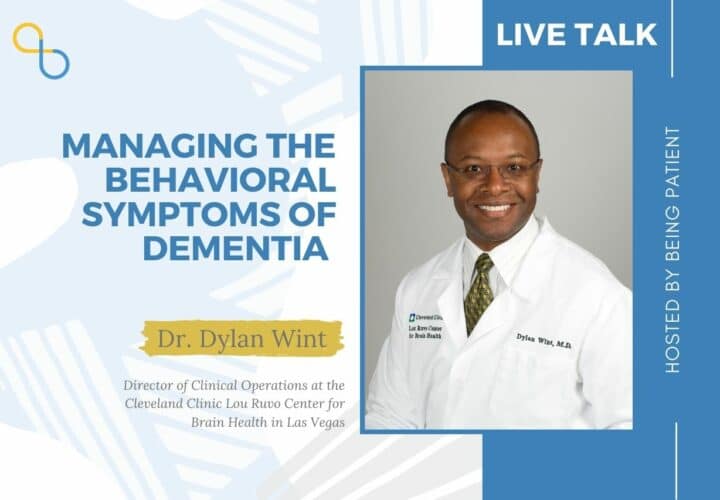As part of our BrainTalk series, Being Patient spoke with Dr. Dylan Wint, director of clinical operations at the Cleveland Clinic Lou Ruvo Center for Brain Health, about the common behavioral symptoms of dementia and interventions to address them.
The behavioral changes associated dementia can be some of the most difficult symptoms to cope with. Compounding the challenge, a number of the drugs commonly prescribed for some of these symptoms carry significant health risks for people living with dementia. Being Patient spoke with Dr. Dylan Wint, director of clinical operations at the Cleveland Clinic Lou Ruvo Center for Brain Health, about dementia’s neuropsychiatric symptoms and how clinicians weigh the risks and benefits of drug interventions.
- Neuropsychiatric symptoms of dementia range from delusions and hallucinations, to depression and anxiety, to agitation and aggression.
- The rate of change in people’s behavioral symptoms helps inform doctors whether the symptoms are due to dementia itself or other factors.
- Neuropsychiatric symptoms that develop abruptly, perhaps within the span of a few hours or days, may be linked to conditions such as
- an infection,
- dehydration,
- chronic obstructive pulmonary disease (COPD),
- or a change in environment or medication
- among other causes.
Being Patient: What questions do you ask patients with dementia who experience behavioral symptoms?
Dr. Dylan Wint: One of the key questions that I ask when a behavioral problem develops is the space of time over which it develops because behavioral problems that develop over hours or days, tend less likely to be due to the disease itself as opposed to some other factor [including] dehydration, infection, sometimes COPD. The time course over which the symptom has developed is really, really crucial.
So someone comes in and says, “Things were going fine until last week. Since then he’s been really agitated [and] throwing things.” That’s a pretty rapid change in the timescale of dementia. Whereas [if someone says], “There’s always been some irritability, but over the past year we’ve seen it get worse and worse,” that is more in line with the degenerative changes that occur in dementia.
Let’s assume that we’re talking about something that has developed [as] one of the symptoms of dementia: One key question is the extent to which that behavioral symptom interferes with care. Is the person not eating? Are they aggressive or agitated [and] does it interfere with sleep? Safety is going to be the top priority when addressing any behavioral condition, [which] includes both preventing acts of commission [such as] striking out, but also acts of omission – not eating, not bathing, not taking medications and so forth.
I do try and assess the extent to which this is something that is affecting the caregiver’s quality of life, or the patient’s quality of life, not because one is more important than the other but because the way of managing it may be very different. It may be caregiver support that you need to provide [if] a behavioral symptom is really frustrating for a caregiver, [and] it’s not getting in the way of care and it’s not dangerous.
Anytime we use a medication to treat behavioral symptoms, we’re exposing a patient to a risk because we’re putting a chemical in their body. There has to be some benefit to the patient.
Being Patient: How do doctors figure out what medications to prescribe?
Dr. Dylan Wint: There are broad categories [of symptoms] and there are medicines that seem to generally do better than others within those broad categories.
There are psychosis symptoms. Those would include delusions, which are fixed false beliefs with no support in reality, and hallucinations, which are sensory experiences [of] hearing, seeing, feeling something that’s not actually there.
There are mood symptoms which can include depression, anxiety, apathy. Then there are hyperactive symptoms [like] agitation, aggression, aberrant motor behaviors such as pacing and picking.
For psychosis, antipsychotics seem to be the only thing that’s effective. For aggression and agitation, there is evidence that SSRIs [selective serotonin reuptake inhibitor] can be useful. Similarly for mood symptoms with the exception of apathy, the serotonin increasing agents seem to be the best.
Being Patient: One of our viewers has asked about the symptoms of frontotemporal dementia, can you tell us more about the common features of this form of dementia?
Dr. Dylan Wint: People with frontotemporal dementia very commonly have behavioral problems. There’s a subtype of frontotemporal dementia called [the] behavioral variant where the primary symptoms are behavioral.
Those behaviors are typically disinhibition, loss of empathy … sometimes there will be ritualistic behaviors [of doing] a particular thing over and over the same way. The behavioral problems in frontotemporal dementia seem to respond most robustly to serotonin agents, and a medicine called trazodone does have a couple studies demonstrating its effectiveness in controlling frontotemporal dementia symptoms.
Being Patient: Many people are struggling to cope with the public health restrictions during COVID-19. Would it be reason to medicate a person with dementia who begins experiencing depression?
Dr. Dylan Wint: Not necessarily. We know that adjustment to life circumstances can cause changes in mood. But we also know that those changes in mood could potentially trigger a major depressive episode.
What antidepressants seem to help with are people who have a depressed or anhedonic (lack of pleasure) mood in the presence of several other symptoms, usually including sleep disturbance, disturbance in appetite, psychomotor slowing, agitation, decreased interest, decreased energy. Antidepressants are meant to treat a syndrome that consists of several symptoms. So it would depend on what kinds of other symptoms this person is experiencing.
But in general, if we can address things with non-medication means, it’s a better way to go. Maybe [the person] could go for a walk up and down the driveway each day. Are we making sure that there’s plenty of sunlight in the house when it’s daytime and plenty of things to do to replace things that you can’t go out and do? Those sorts of measures are generally preferable to using medications.
The interview has been edited for length and clarity.
Contact Nicholas Chan at nicholas@beingpatient.com



